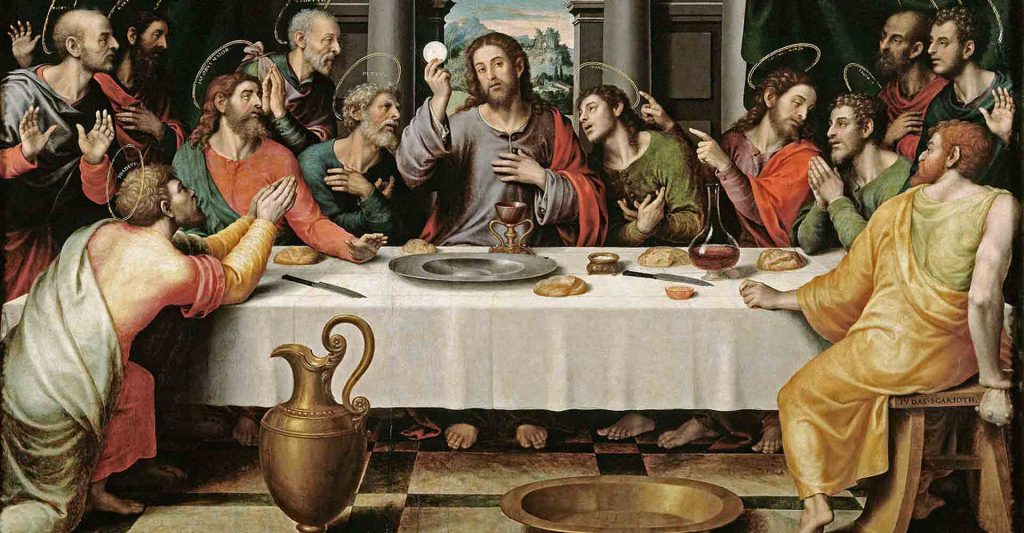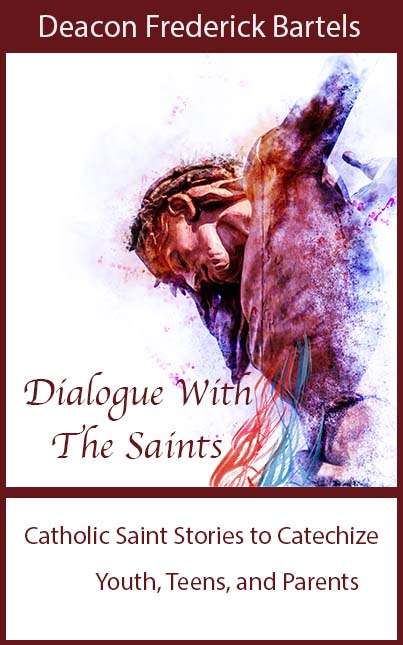
The Parable of the Marriage Feast, as the Ignatius Study Bible reminds us, is an “allegory of salvation history culminating” in the Lord Jesus. The king in the parable is God, who prepares a wedding feast for his beloved son.
By Deacon Frederick Bartels
20 August 2020
Our gospel today on this Memorial of St. Bernard is the Parable of the Marriage Feast:
Jesus again in reply spoke to the chief priests and the elders of the people in parables saying, “The Kingdom of heaven may be likened to a king who gave a wedding feast for his son. He dispatched his servants to summon the invited guests to the feast, but they refused to come. A second time he sent other servants, saying, ‘Tell those invited: “Behold, I have prepared my banquet, my calves and fattened cattle are killed, and everything is ready; come to the feast.”’ Some ignored the invitation and went away, one to his farm, another to his business. The rest laid hold of his servants, mistreated them, and killed them. The king was enraged and sent his troops, destroyed those murderers, and burned their city. Then the king said to his servants, ‘The feast is ready, but those who were invited were not worthy to come. Go out, therefore, into the main roads and invite to the feast whomever you find.’ The servants went out into the streets and gathered all they found, bad and good alike, and the hall was filled with guests. But when the king came in to meet the guests he saw a man there not dressed in a wedding garment. He said to him, ‘My friend, how is it that you came in here without a wedding garment?’ But he was reduced to silence. Then the king said to his attendants, ‘Bind his hands and feet, and cast him into the darkness outside, where there will be wailing and grinding of teeth.’ Many are invited, but few are chosen.”
Matt 22:1-14
The Parable of the Marriage Feast, as the Ignatius Study Bible reminds us, is an “allegory of salvation history culminating” in the Lord Jesus. The king in the parable is God, who prepares a wedding feast for his beloved son. The servants can be seen as OT prophets who were called to summon Israel to follow the will of God and to prepare the way for Christ. Since some of the invited guests ignore the prophets and kill them, God will destroy their city Jerusalem as punishment. God sends other servants, the apostles, to invite both good and bad Gentiles to the feast and thus provide a universal invitation. Those who arrive at the feast without proper attire are guests who lack righteous deeds accomplished in faith. Consequently, they are cast into the darkness of eternal punishment in hell.
This parable from our Lord Jesus teaches us that God’s call is universal: he calls everyone, in every state of life and spiritual condition to faith in Christ. However, people will be rewarded or punished on the basis of their response to his call. Those who ignore or reject it or arrive at the feast without the attire of righteousness will be punished, whereas those who respond in free and loving obedience to God’s call and do his works will be rewarded. Furthermore, those who actively work against the wishes of the Divine King are his enemies and thus will incur his wrath.
There are many possible spiritual meanings found in this parable. One is that it points to the reality of the holy sacrifice of the Mass as the marriage supper of the Lamb of God (Rev 19:9). On one level, we are reminded of the importance of wearing the proper attire in a literal way because of the infinite sacredness of the Mass. The sacrifice of the Mass is the re-presentation of the saving sacrifice of Christ on the cross. At each Mass, the body and blood of Christ is offered to the Father in expiation of sin and in thanksgiving for the gift of redemption. The faithful should be diligent, whenever possible, in wearing their best clothes to the marriage feast of the Lamb, for it is the most sacred event in the cosmos. Those who are deliberately careless in this area disrespect the Lord.
On another level, we are reminded of the requirement to entrust ourselves to the incarnate Son of God in faith and complete his works as his righteous disciples. The good works we accomplish in faith are the works God has prepared for us beforehand in Christ. Therefore, in accomplishing good works, Christ crowns in us the gifts he has himself provided. Authentically good works accomplished in faith and charity are supernaturally good works that are pleasing to God.
Additionally, those who partake of the body and blood of the Lord at the marriage feast must be worthy to do so—they must wear the “proper attire” in that they must be in a state of grace. Being in a state of grace means possessing sanctifying grace and the indwelling Spirit of God. If one is conscious of having sinned in a grave way, he must not receive the body and blood of the Lord, for if he does so he may incur judgment in his guilt for profaning the body and blood of the Lord (cf. 1 Cor 11:27-30). If one commits mortal sin and receives the Eucharist, he piles up mortal sin on mortal sin.
Read about the power of the Eucharist.
The Parable of the Marriage Feast also reminds us of the urgency of responding to the invitation of God. Today is the day of salvation:
As we work together with him, we urge you also not to accept the grace of God in vain. For he says, “At an acceptable time I have listened to you, and on a day of salvation I have helped you.” See, now is the acceptable time; see, now is the day of salvation!
2 Cor 6:1-2
At the end of the parable, we hear these words: “Many are invited, but few are chosen.” This speaks directly against those who today portray hell as empty, as if the demands and warnings of God are to be understood in permissiveness, or as if God treats the unjust and the just in the same way—a faithless viewpoint that must be condemned because it leads souls into hell. Those who believe all are saved mock the Lord Jesus Christ and reject his clear words found in the saving gospel.
These last words also serve as a warning to those who would call themselves “Catholic” or “Christian,” insisting on their place at the marriage feast while yet living in ways opposed to the love of God and supporting intrinsic evils that align with Satan’s wishes. Examples abound in our age of moral relativism and sexual permissiveness. I urge Catholics to especially pray for Catholic politicians who are currently found as enemies of life, truth, goodness, and love by their support for intrinsic evils like abortion, euthanasia, and same-sex “marriage.” Additionally, we must pray for President Trump that he may stay the course in protecting life and human dignity and receive the grace necessary to resist the attacks of the evil one.

Deacon Frederick Bartels is a member of the Catholic clergy who serves the Church in the diocese of Pueblo. He holds an MA in Theology and Educational Ministry, and is a Catholic educator, public speaker, and evangelist who strives to infuse culture with the saving principles of the gospel. For more, visit YouTube, iTunes and Twitter.

Leave a Reply